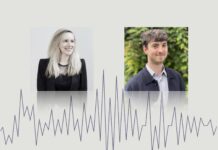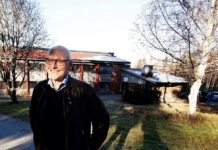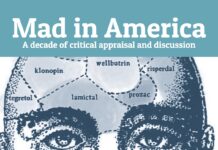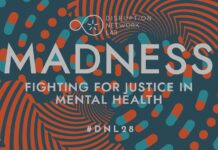Everyone’s Afraid of an Angry Woman: Honoring Sinéad O’Connor
In her tragic passing, I choose to honor her by raising up these words she said, by hearing and believing them.
ChatGPT Changes Its Mind: Maybe Antidepressants Do More Harm Than Good
This week, I wanted to see what ChatGPT would have to say about the long-term impact of antidepressants and about the STAR*D study.
Sharon Lambert and Naoise Ó Caoilte—Mental Health Podcasts: A Force for Good in a...
Researchers from University College Cork discuss their research on the benefits of listening to mental health related podcasts which indicates that podcasts improve mental health literacy, and reduce stigma.
Can ChatGPT Defend the Long-term Use of Antipsychotics?
ChatGPT has perfectly captured the pattern of psychiatry’s response to the research that tells of harm done.
Q&A: How Can We See ADHD From Another Angle, and What Can We Do...
We all want to help our kids or our students, and sometimes finding the right key to unlock a child’s gifts is a matter of time, patience, trial, and error.
Only When It Poured
Disposable toothbrushes and sporks. Crayons instead of pens. Little pills in little paper cups. Someone would come. Someone would go. The days turned into nights and back again.
Chris Bullard—The Sound Mind Live Festival
Chris Bullard is the executive-director of the Sound Mind Live Festival which uses music as a connective force to bring people together to help address mental health stigma.
Chris van Tulleken—Ultra-Processed People: Why Do We All Eat Stuff That Isn’t Food and...
We are joined by Dr. Chris van Tulleken who talks about the science, economics, history, and production of ultra-processed food. We discuss some of the effects of UPF on our brains and bodies and how the food industry positions UPF to dominate our diets.
Giving Caregivers a Platform: Elianna, Mother of Brandon
An interview with Elianna, who lives in Colorado with her son, Brandon, 34. His many diagnoses and misdiagnoses include autism and schizophrenia.
David Carmichael—The Antidepressant Safety Tour
Drug safety advocate David Carmichael joins us to discuss his upcoming antidepressant safety tour and the importance of fully informed consent when prescribing SSRI antidepressants.
Waking From the Nightmare: Is Recovery From Akathisia Possible?
I had a chemical brain injury from medications. The only help doctors could offer was more medications: treating the failed treatment with other dangerous treatments.
The Misery of Being Misdiagnosed and Overmedicated
From an early age, relatives and doctors alike had told me I was severely mentally ill. Naturally, I believed them.
Tanya Frank—Zig-Zag Boy: My Family’s Struggles With Broken Mental Healthcare
Author Tanya Frank discusses her book 'Zig-Zag Boy A Memoir of Madness and Motherhood', which chronicles the experiences of her son Zach who experienced psychosis as a 19-year-old.
Mad Poetry Slam!
Poets with lived experience with mental distress are invited to perform their poetry live at MIA's Mad Poetry Slam on Zoom on May 7th, 12PM EST.
Screening for Perinatal Depression: An Effective Intervention, or One That Does More Harm Than Good?
Why does the U.S. describe perinatal screening as providing a proven benefit, while the task forces in the U.K. and Canada see no evidence of such benefit?
Black Movement Leaders: Lost & Found
As some of us get caught up in lamenting the whiteness of our movement, we are actively losing the stories of Black leaders.
Critical Psychiatry Textbook, Chapter 2: Are Psychiatric Disorders Mainly Genetic or Environmental? (Part Two)
In this chapter, Peter Gøtzsche discusses the problems with observational studies and other flaws in ADHD research.
Fernando de Freitas: A “Dear Friend” Who Was a Warrior for Radical Change
Fernando de Freitas, co-founder of Mad in Brasil, passed away January 30. He had devoted his professional life to seeking to transform psychiatric care in Brazil and beyond.
Leading Psychiatrists Unwittingly Acknowledge Psychiatry Is a Religion, Not a Science
Leading figures in psychiatry acknowledge that DSM psychiatric diagnoses and the chemical imbalance theory of mental illness are not scientifically valid, but are useful fictions that help people manage their emotions and comply with their medication treatments.
A Revolution Wobbles: Will Norway’s “Medication-Free” Hospital Survive?
We interview Ole Andreas Underland, Director of the Hurdalsjøen Recovery Center in Norway which provides “medication-free” care for those who want such treatment or who want to taper from their psychiatric drugs. Ole Andreas explains why the success of this pioneering approach might threaten its future.
Mad in America’s 10 Most Popular Articles in 2022
A roundup of Mad in America's most read blogs and personal stories of 2022 as chosen by our readers.
Ten Years of Rocking the Boat: Reflecting on Mad in America’s Mission and Work
Continuing our 200th podcast, staff members join us to discuss reinvigorating MIA continuing education, science writing and blogs, personal stories, community commenting and family resources.
Art and Transformation: Creating Justice in Mental Health
An upcoming conference focuses on the perspective of artists and activists in answering what it means to have a just mental health care system: Who decides who is labelled as mad?
David Healy – Polluting Our Internal Environments: The Perils of Polypharmacy
On the MIA Podcast, Dr David Healy discusses World Tapering Day, antidepressant treatment and sensory neuropathy and the difficulties that can be encountered when trying to deprescribe.
Anders Sørensen – Tackling Psychiatric Drug Withdrawal Through Research and in Practice
Anders Sørenson is a Danish clinical psychologist with a special interest in psychiatric drug withdrawal. He has undertaken research which assesses the state of guidance on psychiatric drug withdrawal and paid close attention to tapering methods with the aim of identifying approaches which might make withdrawal more tolerable for people.

































